9 july 2015
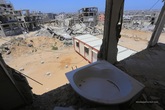
European mediators have attempted to convince Hamas to release the bodies of two Israeli soldiers killed during Operation Protective Edge last summer. Netanyahu's government is utilising the circumstances to further the settler-colonial state's patriotic drivel. Within Israel, demands for the release of the soldiers will continue the distortion of Gaza's narrative, absolving the soldiers of complicity in murder and erroneously defining the massacres in Gaza as defence.
So far Hamas has refused to comply with the external imposition. According to the Palestinian Information Center, Hamas is declining discussion regarding the issue until Israel releases all the political prisoners freed in the Shalit deal and who were rearrested during Operation Brother's Keeper – the Israeli incursions into the West Bank aided by the PA which marked the prelude to Operation Protective Edge.
Israeli media is distorting Hamas' decision as "seeking a major gain before it even consents to negotiate for the Israelis it is holding dead and alive." Khaled Meshaal's statements, which steadfastly refuted concessions, have been misinterpreted by the Times of Israel as an act of repaying "a pre-war debt to the Palestinian public".
The issue is not seeking compensation, but rather upholding the Palestinians' right to anti-colonial struggle and resistance. Operation Protective Edge, which was also in ways endorsed by the Palestinian Authority through its remarks that ridiculed Palestinian resistance against Israeli aggression, was another attempt at reducing population and territory through massacres and displacement, thus ensuring that while half-hearted attempts by international organisations such as the UNHRC would suggest war crimes as a possibility, Israel would remain safely ensconced, away from the parameters that define genocide within international law's interpretation.
Additionally, threats against Palestinians in Gaza have once again emanated from former MK Dr Michael Ben-Ari. According to Israel National News, refusal on behalf of Hamas to cooperate in returning the bodies of two complicit soldiers, who Ben-Ari defines as "saints", Israel should seek retribution.
"If they want to live let them return the bodies of the warriors. There is no reason that we should be 'responsible'. This is the time to go crazy and to show IDF soldiers and their families that they are the dearest thing to us," declared Ben-Ari.
Such threats against Hamas and Palestinians in Gaza are hardly an innovation. Ben-Ari's disgusting and blatant colonial suggestions in the past included the elimination of the Palestinian population through military measures or mass transfer of Palestinians in Gaza to the Sinai.
It has since become known that one of the dead Israeli soldiers whose remains are held by Hamas may have been a result of the IDF breaching the Hannibal Protocol. The Protocol allows excessive rifle firing in the case of abduction "even at the price of harming or wounding our soldiers." However, the army is expected to refrain from killing anyone of its own – a premise gone wrong when Hamas launched an attack against soldiers from the Givati Brigade and succeeded in killing two as well as abducting Lt Hadar Goldin.
Israel may continue to assert its hypocritical democratic façade and blame Hamas for resisting its premeditated violence. However, its alleged code of ethics has once again proved that everyone, including its complicit settlers and soldiers, are dispensable when it comes to furthering the Zionist colonial project.
So far Hamas has refused to comply with the external imposition. According to the Palestinian Information Center, Hamas is declining discussion regarding the issue until Israel releases all the political prisoners freed in the Shalit deal and who were rearrested during Operation Brother's Keeper – the Israeli incursions into the West Bank aided by the PA which marked the prelude to Operation Protective Edge.
Israeli media is distorting Hamas' decision as "seeking a major gain before it even consents to negotiate for the Israelis it is holding dead and alive." Khaled Meshaal's statements, which steadfastly refuted concessions, have been misinterpreted by the Times of Israel as an act of repaying "a pre-war debt to the Palestinian public".
The issue is not seeking compensation, but rather upholding the Palestinians' right to anti-colonial struggle and resistance. Operation Protective Edge, which was also in ways endorsed by the Palestinian Authority through its remarks that ridiculed Palestinian resistance against Israeli aggression, was another attempt at reducing population and territory through massacres and displacement, thus ensuring that while half-hearted attempts by international organisations such as the UNHRC would suggest war crimes as a possibility, Israel would remain safely ensconced, away from the parameters that define genocide within international law's interpretation.
Additionally, threats against Palestinians in Gaza have once again emanated from former MK Dr Michael Ben-Ari. According to Israel National News, refusal on behalf of Hamas to cooperate in returning the bodies of two complicit soldiers, who Ben-Ari defines as "saints", Israel should seek retribution.
"If they want to live let them return the bodies of the warriors. There is no reason that we should be 'responsible'. This is the time to go crazy and to show IDF soldiers and their families that they are the dearest thing to us," declared Ben-Ari.
Such threats against Hamas and Palestinians in Gaza are hardly an innovation. Ben-Ari's disgusting and blatant colonial suggestions in the past included the elimination of the Palestinian population through military measures or mass transfer of Palestinians in Gaza to the Sinai.
It has since become known that one of the dead Israeli soldiers whose remains are held by Hamas may have been a result of the IDF breaching the Hannibal Protocol. The Protocol allows excessive rifle firing in the case of abduction "even at the price of harming or wounding our soldiers." However, the army is expected to refrain from killing anyone of its own – a premise gone wrong when Hamas launched an attack against soldiers from the Givati Brigade and succeeded in killing two as well as abducting Lt Hadar Goldin.
Israel may continue to assert its hypocritical democratic façade and blame Hamas for resisting its premeditated violence. However, its alleged code of ethics has once again proved that everyone, including its complicit settlers and soldiers, are dispensable when it comes to furthering the Zionist colonial project.
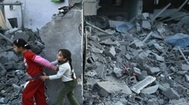
In the early summer of 2014, all the given indicators were pushing for a new confrontation between the Palestinian resistance and the Israeli occupation, notably after the continued Israeli escalations in the West Bank and the Gaza Strip.
On the political side, Israel refused to release of the fourth batch of prisoners as it was agreed with the Palestinian Authority (PA) what pushed the PA to sign in a request in early April to join 15 organizations and international treaties in the United Nations. PA had also, signed on 23th of the same month on an agreement of reconciliation with the "Hamas" Islamic Resistance Movement.
While on the field level, three Israeli settlers were kidnapped in Hebron in June 12. In its wake, the Israeli army launched a large-scale military campaign, before they were found dead in the 30th of the same month near Halhul, what blew up Israeli claims of retaliation.
Tension peaked after a Palestinian child Muhammed Abu Khdair, from Shuafat in Jerusalem, was kidnapped, tortured and burned to death at the hands of three settlers on 2 July. In addition to the re-arrest of dozens of ex-prisoners who were freed in 2011 swap deal.
These violations were followed by mass protests in Jerusalem and in the occupied territories in 1948, as well as areas of the West Bank.
The situation intensified after an Israeli settler ran over two Arab workers near the occupied Haifa. This escalation included an intermittent tension in the Gaza Strip, when Israeli occupation assassinated, on Monday 7th of July six members of the al-Qassam Brigades in a raid targeted a ground tunnel east of Rafah, southern the Gaza Strip.
The assassination process met with the Palestinian resistance responses. Then the Israeli army declared the launch of a wide military offensive. The Israeli Cabinet recalled 40 reserve soldiers, while the Palestinian resistance declared their readiness to confront the Israeli attack.
Within 48 hours after launch of the war, "Israel" carried out nearly 500 raids and targeted the infrastructure and sewage networks, electricity and telecommunications, and destroyed 55 houses and targeted a number of governmental buildings.
Over the course of the 51 days, death toll reached to 2217, including 556 children and (293) women, while the total number of wounded children who have been spotted (2647) and (1442) wounded women.
Israeli occupation forces had also demolished and destroyed (31 974) houses, multi-storey residential building, including (8377) houses were completely destroyed, between them (1717) residential buildings.
The number of forcibly displaced people because of the total demolition of their homes reached to (60 612), of them (30 853) children and (16522) women.
The war was over in the evening of 26 August, with a cease-fire announced by President Mahmoud Abbas, while Hamas made it clear that the Palestinian negotiating team in Cairo signed an agreement that put an end to the Israeli aggression in accordance with the presented Egyptian initiative.
The agreement included a comprehensive ceasefire, coinciding with the opening of the crossings between the Gaza Strip and "Israel" in order to allow the humanitarian and relief aids and the reconstruction supplies and fishing zone of six nautical miles.
On the political side, Israel refused to release of the fourth batch of prisoners as it was agreed with the Palestinian Authority (PA) what pushed the PA to sign in a request in early April to join 15 organizations and international treaties in the United Nations. PA had also, signed on 23th of the same month on an agreement of reconciliation with the "Hamas" Islamic Resistance Movement.
While on the field level, three Israeli settlers were kidnapped in Hebron in June 12. In its wake, the Israeli army launched a large-scale military campaign, before they were found dead in the 30th of the same month near Halhul, what blew up Israeli claims of retaliation.
Tension peaked after a Palestinian child Muhammed Abu Khdair, from Shuafat in Jerusalem, was kidnapped, tortured and burned to death at the hands of three settlers on 2 July. In addition to the re-arrest of dozens of ex-prisoners who were freed in 2011 swap deal.
These violations were followed by mass protests in Jerusalem and in the occupied territories in 1948, as well as areas of the West Bank.
The situation intensified after an Israeli settler ran over two Arab workers near the occupied Haifa. This escalation included an intermittent tension in the Gaza Strip, when Israeli occupation assassinated, on Monday 7th of July six members of the al-Qassam Brigades in a raid targeted a ground tunnel east of Rafah, southern the Gaza Strip.
The assassination process met with the Palestinian resistance responses. Then the Israeli army declared the launch of a wide military offensive. The Israeli Cabinet recalled 40 reserve soldiers, while the Palestinian resistance declared their readiness to confront the Israeli attack.
Within 48 hours after launch of the war, "Israel" carried out nearly 500 raids and targeted the infrastructure and sewage networks, electricity and telecommunications, and destroyed 55 houses and targeted a number of governmental buildings.
Over the course of the 51 days, death toll reached to 2217, including 556 children and (293) women, while the total number of wounded children who have been spotted (2647) and (1442) wounded women.
Israeli occupation forces had also demolished and destroyed (31 974) houses, multi-storey residential building, including (8377) houses were completely destroyed, between them (1717) residential buildings.
The number of forcibly displaced people because of the total demolition of their homes reached to (60 612), of them (30 853) children and (16522) women.
The war was over in the evening of 26 August, with a cease-fire announced by President Mahmoud Abbas, while Hamas made it clear that the Palestinian negotiating team in Cairo signed an agreement that put an end to the Israeli aggression in accordance with the presented Egyptian initiative.
The agreement included a comprehensive ceasefire, coinciding with the opening of the crossings between the Gaza Strip and "Israel" in order to allow the humanitarian and relief aids and the reconstruction supplies and fishing zone of six nautical miles.
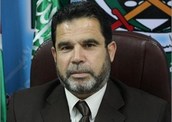
“Intensive” efforts have been made to stabilize the ceasefire between Israeli occupation forces and Palestinian resistance in return for lifting the siege on Gaza, establishing a seaport and an airport, and implementing Gaza reconstruction, senior leader in Hamas Movement Salah Bardawil revealed.
Speaking to Quds Press on Thursday, Bardawil denied reports claiming new ceasefire talks or political negotiations were underway.
There are no new ceasefire talks; however, there are ongoing efforts to stabilize the ceasefire reached in Cairo agreement a year ago, he said.
Bardawil also denied the link between the ceasefire talks and any future prisoners exchange deal.
He stressed the importance of releasing the 53 ex-detainees, who were released as part of Wafa al-Ahrar (Shalit) swap deal, and were then rearrested last summer, before talking about any future prisoner exchange deal.
Israeli TV Channel 2 earlier revealed that Israeli authorities had appointed Lior Lotan at the head of a committee entrusted with negotiations for the return of the Israeli soldiers captured by Hamas.
The appointment came after Israeli Security Services admitted that two Israelis and two dead soldiers are being held captive by Hamas in the blockaded Gaza Strip.
Speaking to Quds Press on Thursday, Bardawil denied reports claiming new ceasefire talks or political negotiations were underway.
There are no new ceasefire talks; however, there are ongoing efforts to stabilize the ceasefire reached in Cairo agreement a year ago, he said.
Bardawil also denied the link between the ceasefire talks and any future prisoners exchange deal.
He stressed the importance of releasing the 53 ex-detainees, who were released as part of Wafa al-Ahrar (Shalit) swap deal, and were then rearrested last summer, before talking about any future prisoner exchange deal.
Israeli TV Channel 2 earlier revealed that Israeli authorities had appointed Lior Lotan at the head of a committee entrusted with negotiations for the return of the Israeli soldiers captured by Hamas.
The appointment came after Israeli Security Services admitted that two Israelis and two dead soldiers are being held captive by Hamas in the blockaded Gaza Strip.
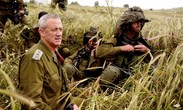
Israeli Occupation Forces (IOF) former Chief of Staff Benny Gantz has described Wednesday Hamas's armed wing fighters as "courageous."
“We must be honest and say that we fought against brave men,” Gantz said during an interview with Israeli TV Channel 2 News on the first anniversary of the Israeli summer aggression on Gaza.
"To run up and try to put an explosive charge upon a tank is the act of courageous people," he added.
The latest conflict in Gaza was the most ruinous of three recent wars, killing more than 2,147 Palestinians, including 530 children and 302 women. Another 11,000 were wounded, and some 100,000 people remain homeless.
The aggression began on July 7 when Israel fired hundreds of missiles at Gaza Strip, destroying dozens of residential buildings and civilian homes.
For its part, Palestinian resistance responded by firing heavy barrages of rockets towards Israeli border areas and carried out unprecedented operations against Israeli military targets.
“We must be honest and say that we fought against brave men,” Gantz said during an interview with Israeli TV Channel 2 News on the first anniversary of the Israeli summer aggression on Gaza.
"To run up and try to put an explosive charge upon a tank is the act of courageous people," he added.
The latest conflict in Gaza was the most ruinous of three recent wars, killing more than 2,147 Palestinians, including 530 children and 302 women. Another 11,000 were wounded, and some 100,000 people remain homeless.
The aggression began on July 7 when Israel fired hundreds of missiles at Gaza Strip, destroying dozens of residential buildings and civilian homes.
For its part, Palestinian resistance responded by firing heavy barrages of rockets towards Israeli border areas and carried out unprecedented operations against Israeli military targets.

The Israeli Occupation Forces (IOF) on Thursday announced their plan to conduct military exercises throughout the day in areas surrounding the Gaza strip, with the goal of preparing against Palestinian attacks on Israeli targets.
The official website of the Israeli Occupation Forces stated that the training would begin in the afternoon and that it would only last one day.
The website also stated that the training is a part of the IOF’s 2015 strategy aimed at preparing the army against potential future risks.
The exercise coincides with the anniversary of Operation Protective Edge, Israel’s war on the Gaza strip last summer which resulted in over 2,250 casualties, the majority of whom were civilians.
The official website of the Israeli Occupation Forces stated that the training would begin in the afternoon and that it would only last one day.
The website also stated that the training is a part of the IOF’s 2015 strategy aimed at preparing the army against potential future risks.
The exercise coincides with the anniversary of Operation Protective Edge, Israel’s war on the Gaza strip last summer which resulted in over 2,250 casualties, the majority of whom were civilians.

Hamas' armed wing, Al-Qassam Brigades, held a rally in Gaza City, late Wednesday, to mark the anniversary of the Israeli war on the Gaza Strip.
According to AFP, several hundred people crowded into a central Gaza City square after the traditional fast-breaking meal during the Muslim holy month of Ramadan for a rally by Al-Qassam Brigades.
Brigades members with their faces covered with black keffiyeh scarves stood in front of what appeared to be models of two missiles about three to four metres (9 to 13 feet) in length aboard the bed of a military truck.
Fathers held their children on their shoulders and brigades members lifted their weapons in the air as spokesman Abu Obeida gave a speech, his face covered as usual in a red keffiyeh.
Abu Obeida said two new locally made missiles represented a "qualitative leap" forward, but did not provide details.
The war took a heavy toll on Gaza, killing 2,251 Palestinians, including more than 500 children. Seventy-three people were killed on the Israeli side, including 67 soldiers.
A UN report released last month said both sides may have committed war crimes during the conflict in and around the impoverished enclave of 1.8 million people.
Israel held a memorial on Monday for its 73 victims killed in the war, where Israeli Prime Minister Benjamin Netanyahu defended the military offensive.
Indirect talks on shoring up the ceasefire and easing Israel's blockade have taken place, but there have been no signs that a deal could be reached anytime soon.
The blockade, as well as a lack of financing from international donors, has been blamed for the slow pace of reconstruction in Gaza, where around 18,000 homes were destroyed or severely damaged.
A split between Hamas and the Palestinian Authority led by president Mahmoud Abbas, which runs the Israeli-occupied West Bank, has worsened the situation. Reconciliation attempts have failed to heal the rift. Meanwhile, Hamas has been challenged by Salafist extremists in Gaza claiming links to the Islamic State jihadist group and who have taken credit for recent rocket fire.
According to AFP, several hundred people crowded into a central Gaza City square after the traditional fast-breaking meal during the Muslim holy month of Ramadan for a rally by Al-Qassam Brigades.
Brigades members with their faces covered with black keffiyeh scarves stood in front of what appeared to be models of two missiles about three to four metres (9 to 13 feet) in length aboard the bed of a military truck.
Fathers held their children on their shoulders and brigades members lifted their weapons in the air as spokesman Abu Obeida gave a speech, his face covered as usual in a red keffiyeh.
Abu Obeida said two new locally made missiles represented a "qualitative leap" forward, but did not provide details.
The war took a heavy toll on Gaza, killing 2,251 Palestinians, including more than 500 children. Seventy-three people were killed on the Israeli side, including 67 soldiers.
A UN report released last month said both sides may have committed war crimes during the conflict in and around the impoverished enclave of 1.8 million people.
Israel held a memorial on Monday for its 73 victims killed in the war, where Israeli Prime Minister Benjamin Netanyahu defended the military offensive.
Indirect talks on shoring up the ceasefire and easing Israel's blockade have taken place, but there have been no signs that a deal could be reached anytime soon.
The blockade, as well as a lack of financing from international donors, has been blamed for the slow pace of reconstruction in Gaza, where around 18,000 homes were destroyed or severely damaged.
A split between Hamas and the Palestinian Authority led by president Mahmoud Abbas, which runs the Israeli-occupied West Bank, has worsened the situation. Reconciliation attempts have failed to heal the rift. Meanwhile, Hamas has been challenged by Salafist extremists in Gaza claiming links to the Islamic State jihadist group and who have taken credit for recent rocket fire.
8 july 2015
|
|
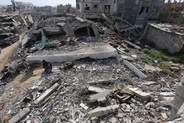
Israel's 51-day operation in Gaza last year was the most "deadly and destructive escalation" of hostilities since its occupation of the Strip in 1967, said the spokesman of the UN Office for the Coordination of Humanitarian Affairs (OCHA) Jens Laerke on Tuesday.
In July and August of last year, more than 2,150 Palestinians were killed and 11,000 injured -- mostly women and children -- during a 51-day Israeli military onslaught against the blockaded Gaza Strip, according to the UN.
Laerke told the reporters in the UN Geneva office that civilians could not leave Gaza during Israeli attacks because borders were closed during the operation and they did not have safe places to hide.
He underlined that 28 percent of Gaza's population had been displaced during those clashes - the biggest displacement so far.
"More than 100,000 people remain displaced because some 12,500 destroyed homes cannot be rebuilt because Israel restricts the importing of building materials and the Palestinian authority cannot do its duty," Laerke said.
"120,000 people cannot reach water," he added. "And 80 percent of the population relies on humanitarian aid."
Regarding the Israel-Palestine conflict, major powers, including the U.S., and international organizations such as the UN, call for a two-state solution, typically based on the borders before the 1967 Six-Day War.
But negotiations have remained at standstill for years.
In July and August of last year, more than 2,150 Palestinians were killed and 11,000 injured -- mostly women and children -- during a 51-day Israeli military onslaught against the blockaded Gaza Strip, according to the UN.
Laerke told the reporters in the UN Geneva office that civilians could not leave Gaza during Israeli attacks because borders were closed during the operation and they did not have safe places to hide.
He underlined that 28 percent of Gaza's population had been displaced during those clashes - the biggest displacement so far.
"More than 100,000 people remain displaced because some 12,500 destroyed homes cannot be rebuilt because Israel restricts the importing of building materials and the Palestinian authority cannot do its duty," Laerke said.
"120,000 people cannot reach water," he added. "And 80 percent of the population relies on humanitarian aid."
Regarding the Israel-Palestine conflict, major powers, including the U.S., and international organizations such as the UN, call for a two-state solution, typically based on the borders before the 1967 Six-Day War.
But negotiations have remained at standstill for years.

Israel's defence minister renewed his belief on Monday that repatriating the bodies of two soldiers killed during last year's war against the people of Gaza is a 'difficult mission'.
According to Quds Press, Moshe Ya'alon made his remark during a ceremony commemorating Israeli soldiers lost in the Gaza Strip during the 51-day Israeli offensive. Attended by Prime Minister Benjamin Netanyahu and President Reuven Rivlin, the event was held in Jerusalem's military cemetery.
"The Israeli defence leadership is committed to return the corpses of the two soldiers," insisted Ya'alon. "This is an ethical duty; they went into battle upon our demand."
Nevertheless, he acknowledged that getting their bodies will be "difficult" and "full of hardships." Israel, he added, has "an aggressive enemy, who does not have a human sense."
Netanyahu assured those present that the government will exert its "utmost effort" to regain the corpses of Saul Oron and Hadar Golden to be buried in Israel. "This is gratitude for them and for their families."
Netanyahu, whose offensive killed around 2,260 Gazans, including more than 500 children, and who now rejects the two-state solution, turned to an old propaganda canard to emphasise his point. "We love peace and we are eager to defend ourselves, our sons and future," he claimed. "We love life, but our enemies love death."
It was said that at least two Israeli soldiers were lost during last summer's Israeli attack on Gaza. The Palestinian resistance has been refusing to provide information about the men, although it has claimed to have captured one of them.
According to Quds Press, Moshe Ya'alon made his remark during a ceremony commemorating Israeli soldiers lost in the Gaza Strip during the 51-day Israeli offensive. Attended by Prime Minister Benjamin Netanyahu and President Reuven Rivlin, the event was held in Jerusalem's military cemetery.
"The Israeli defence leadership is committed to return the corpses of the two soldiers," insisted Ya'alon. "This is an ethical duty; they went into battle upon our demand."
Nevertheless, he acknowledged that getting their bodies will be "difficult" and "full of hardships." Israel, he added, has "an aggressive enemy, who does not have a human sense."
Netanyahu assured those present that the government will exert its "utmost effort" to regain the corpses of Saul Oron and Hadar Golden to be buried in Israel. "This is gratitude for them and for their families."
Netanyahu, whose offensive killed around 2,260 Gazans, including more than 500 children, and who now rejects the two-state solution, turned to an old propaganda canard to emphasise his point. "We love peace and we are eager to defend ourselves, our sons and future," he claimed. "We love life, but our enemies love death."
It was said that at least two Israeli soldiers were lost during last summer's Israeli attack on Gaza. The Palestinian resistance has been refusing to provide information about the men, although it has claimed to have captured one of them.
|
|
Over 2,200 martyrs were killed during Israel's offensive against the people of the Gaza Strip last summer. According to a new report from the Palestinian Centre for Human Rights (PCHR), 75.7 per cent of those killed in the war were civilians, including 530 children, making up 24 per cent. Just under 15 per cent of those killed were women.
The overwhelming majority of the 10,895 wounded in the Israeli assault were also civilians. Of these, 30.03 per cent were children, and 19.4 per cent were women. The other statistics of the war are just as staggering. Israel made 8,210 separate attacks on the Gaza Strip, launched 15,736 rockets from gunboats and fired 36,718 shells. Israeli aircraft and artillery destroyed 17,132 homes, 2,465 of them completely. In the final days of the war, fighter jets destroyed three residential towers in Gaza City, housing hundreds of families. |
In addition, the Israelis targeted 48 charities, which provided services to over 200,000 people. Direct and indirect losses sustained by the Palestinian economy are estimated at $3.6 billion. Nine water treatment plants were bombed, as were 18 electrical facilities, 19 financial and banking institutions, 372 industrial and commercial institutions, 55 fishing boats, 10 hospitals, 19 health centres and 36 ambulances. Of the 222 schools attacked, 141 were government schools, 76 were run by UNRWA and five were private institutions. Six universities were also targeted, along with an electricity generating plant.
The difficult conditions under which the Palestinians are still living, a year after the attack, have driven them to criticise the delays in the reconstruction of the infrastructure by international donors and the Palestinian Authority. Promises to rebuild the destroyed homes have not been fulfilled apart from that made by Qatar to build 1,000 housing units. It is now coordinating with the Israelis and Palestinians to get the required construction material.
However, this will not end the crisis, as a number of families still remain without proper shelter and are living in tents. Many industrial facilities and schools are closed down because they require renovation and reconstruction.
MEMO Photographer: Mohammad Asad
The difficult conditions under which the Palestinians are still living, a year after the attack, have driven them to criticise the delays in the reconstruction of the infrastructure by international donors and the Palestinian Authority. Promises to rebuild the destroyed homes have not been fulfilled apart from that made by Qatar to build 1,000 housing units. It is now coordinating with the Israelis and Palestinians to get the required construction material.
However, this will not end the crisis, as a number of families still remain without proper shelter and are living in tents. Many industrial facilities and schools are closed down because they require renovation and reconstruction.
MEMO Photographer: Mohammad Asad

A prominent Israeli professor, and author of the Israeli army's code of conduct, has claimed that Israeli soldiers killed one of their own in order to prevent a capture in Gaza last summer.
Prof. Asa Kasher, of Tel Aviv University, said that he could not give any details of the incident, but confirmed that there is a "solid base" to the story.
According to Kasher, the death was the result of a misunderstanding of the Hannibal Directive, a secret protocol for responding to a suspected abduction which is frequently reported to allow for the use of lethal force even at the risk of the abductee's life.
During 'Operation Protective Edge', the Hannibal Directive is confirmed to have been used in Rafah on August 1, when Israeli forces committed atrocities in an attempt to prevent the capture of missing soldier Hadar Goldin.
Kasher made the remarks on Wednesday at a rabbinical organisation's conference.
See also: Israeli Officer Admits Ordering Strike to Kill Captured Soldier
Israeli army: We attacked Rafah heavily to prevent Goldin's capture
Report: 5 of the 64 Soldiers Killed in Gaza Invasion Were Killed by ‘Friendly Fire’
Prof. Asa Kasher, of Tel Aviv University, said that he could not give any details of the incident, but confirmed that there is a "solid base" to the story.
According to Kasher, the death was the result of a misunderstanding of the Hannibal Directive, a secret protocol for responding to a suspected abduction which is frequently reported to allow for the use of lethal force even at the risk of the abductee's life.
During 'Operation Protective Edge', the Hannibal Directive is confirmed to have been used in Rafah on August 1, when Israeli forces committed atrocities in an attempt to prevent the capture of missing soldier Hadar Goldin.
Kasher made the remarks on Wednesday at a rabbinical organisation's conference.
See also: Israeli Officer Admits Ordering Strike to Kill Captured Soldier
Israeli army: We attacked Rafah heavily to prevent Goldin's capture
Report: 5 of the 64 Soldiers Killed in Gaza Invasion Were Killed by ‘Friendly Fire’
7 july 2015
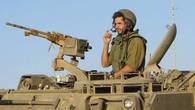
Preparing myself
Reservists don't have the benefit of a full time military mindset, this is my story, as a student turned soldier in Operation Protective Edge.
One year ago I was sitting in the living room of my apartment with my friend Rebecca, just casually studying for the final exam of my BA. We had the news on in the background and our eyes were constantly shifting from the stacks of notes on the table to the constant alerts of rocket fire and sirens wailing.
I knew it was just a matter of time before the residents of Tel Aviv would get to sample the experience of running for shelter, but at that moment I remember looking forward to it, like it was some sort of attraction, something to make life more interesting. Because after all, I had just joked with Rebecca – I would never be drafted; it was an impossibility.
My head and my heart kept wandering to my family in the south; how where they? Was yet another round of violence destroying any semblance of normalcy they had retained? That’s when I remember seeing the news that tens of thousands of reservists where being drafted. I looked at Rebecca and gave off a nervous chuckle. Things where getting real very quickly, but come on, this is the same thing that happened during Pillar of Defense. They drafted thousands, including my friends, who ended up sitting on the border for two weeks just training. Call it climax-less suspense, a true feeling of powerlessness.
I peeked back at the TV, and that’s when my phone rang; it was sitting on the couch. I ran over to grab it and answered. Something very strange happened, a truly surreal moment that I cant quite describe. A robotic voice spoke into the line, quickly followed by the voice of a young woman in an almost inaudible voice telling me my unit had been activated under emergency protocols and that I had to reach my emergency meeting point immediately. It’s highly probable that my face went pale in that moment, I’m not really sure – I’d have to ask Rebecca.
I just wasn't expecting the call, but somewhere deep in my subconscious, I wanted it. As soon as I lifted my head and turned around I told Rebecca. She also had a fazed look on her face. “Are you sure?” she asked. “Yeah," I replied. This was the moment I had mentally prepared for, and while the uncertainty and anxiety still clung to my face, I knew I had to go.
I made a bee-line for my bedroom, threw on my uniform, grabbed my "go" bag (its been packed since I was released in 2011), threw in every pair of socks and underwear I could find, closed the zipper, and I was ready – at least physically. I dropped her off and drove away.
As soon as I pulled away from her street, I started hearing the wail of that siren that we had become so accustomed to. A message immediately broke the radio broadcast: “Sirens in Tel Aviv.” People ran from their cars (myself included), and took cover under buildings. People where panicking, but it was over as soon as it started and I got back in the car and drove away.
At this point I began calming myself down and putting things into perspective. "Who knows," I thought, "maybe we won't even go in." I caught my breath, called my parents and broke the news to them. I could hear the anxiety in their voices, that this was the moment they had been praying to avoid for years. I tried to calm them down, giving them the same speech I had given myself, “Don’t worry, abba, everything will be all right.” Little did I know how drastically things would change for me.
Overwhelming Confusion
Reservists don't have the benefit of a full time military mindset, this is my story, as a student turned soldier in Operation Protective Edge.
One year ago I was sitting in the living room of my apartment with my friend Rebecca, just casually studying for the final exam of my BA. We had the news on in the background and our eyes were constantly shifting from the stacks of notes on the table to the constant alerts of rocket fire and sirens wailing.
I knew it was just a matter of time before the residents of Tel Aviv would get to sample the experience of running for shelter, but at that moment I remember looking forward to it, like it was some sort of attraction, something to make life more interesting. Because after all, I had just joked with Rebecca – I would never be drafted; it was an impossibility.
My head and my heart kept wandering to my family in the south; how where they? Was yet another round of violence destroying any semblance of normalcy they had retained? That’s when I remember seeing the news that tens of thousands of reservists where being drafted. I looked at Rebecca and gave off a nervous chuckle. Things where getting real very quickly, but come on, this is the same thing that happened during Pillar of Defense. They drafted thousands, including my friends, who ended up sitting on the border for two weeks just training. Call it climax-less suspense, a true feeling of powerlessness.
I peeked back at the TV, and that’s when my phone rang; it was sitting on the couch. I ran over to grab it and answered. Something very strange happened, a truly surreal moment that I cant quite describe. A robotic voice spoke into the line, quickly followed by the voice of a young woman in an almost inaudible voice telling me my unit had been activated under emergency protocols and that I had to reach my emergency meeting point immediately. It’s highly probable that my face went pale in that moment, I’m not really sure – I’d have to ask Rebecca.
I just wasn't expecting the call, but somewhere deep in my subconscious, I wanted it. As soon as I lifted my head and turned around I told Rebecca. She also had a fazed look on her face. “Are you sure?” she asked. “Yeah," I replied. This was the moment I had mentally prepared for, and while the uncertainty and anxiety still clung to my face, I knew I had to go.
I made a bee-line for my bedroom, threw on my uniform, grabbed my "go" bag (its been packed since I was released in 2011), threw in every pair of socks and underwear I could find, closed the zipper, and I was ready – at least physically. I dropped her off and drove away.
As soon as I pulled away from her street, I started hearing the wail of that siren that we had become so accustomed to. A message immediately broke the radio broadcast: “Sirens in Tel Aviv.” People ran from their cars (myself included), and took cover under buildings. People where panicking, but it was over as soon as it started and I got back in the car and drove away.
At this point I began calming myself down and putting things into perspective. "Who knows," I thought, "maybe we won't even go in." I caught my breath, called my parents and broke the news to them. I could hear the anxiety in their voices, that this was the moment they had been praying to avoid for years. I tried to calm them down, giving them the same speech I had given myself, “Don’t worry, abba, everything will be all right.” Little did I know how drastically things would change for me.
Overwhelming Confusion
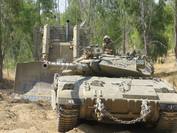
I finally reached our meeting point later that evening, parked my car, stepped out and grabbed my bag. As I began walking to the base’s gate, I remember a very sudden calm overwhelming me. I can't remember why, but it felt like all the stress I had experienced earlier was relieved; regardless of what I would do, I was in this. I felt that in this one moment a sliver of pride had cut through the thick air. I was called upon to defend my country; I would no longer be a passive bystander, dreading the news.
“So do you think this is the real deal?” everyone was wondering out loud. Pretty recently, I put up a picture of that night on Facebook with the caption “we had no clue.” The replies just confirmed what I already knew -- we really were clueless.
That night everyone went to sleep exhausted, lulled by a false sense of confidence that it wouldn't be that bad -- I remember the phrase “Gag Shavua” – meaning maximum one week and we go home. Boy, were we wrong. Those first few days are kind of a blur to me; we spent them preparing our APCs (armored personnel carriers) for battle, loading equipment and talking with friends.
It was hot – that I remember. But mostly I remember the unwavering uncertainty as the days passed and the feeling that we were going to make a difference began to dissipate. We just waited and waited some more. Finally, about three or four days later, we got our marching orders, loaded our equipment onto trucks, and ourselves onto buses before heading off into the unknown.
Helmets and flak jackets
“So do you think this is the real deal?” everyone was wondering out loud. Pretty recently, I put up a picture of that night on Facebook with the caption “we had no clue.” The replies just confirmed what I already knew -- we really were clueless.
That night everyone went to sleep exhausted, lulled by a false sense of confidence that it wouldn't be that bad -- I remember the phrase “Gag Shavua” – meaning maximum one week and we go home. Boy, were we wrong. Those first few days are kind of a blur to me; we spent them preparing our APCs (armored personnel carriers) for battle, loading equipment and talking with friends.
It was hot – that I remember. But mostly I remember the unwavering uncertainty as the days passed and the feeling that we were going to make a difference began to dissipate. We just waited and waited some more. Finally, about three or four days later, we got our marching orders, loaded our equipment onto trucks, and ourselves onto buses before heading off into the unknown.
Helmets and flak jackets
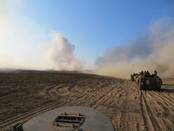
I remember driving into the darkness, finally reaching the area that was within immediate range of the rockets. The bus pulled over and the tension was so thick you could cut it with a knife. “Put on your helmets and flak jackets,” our commander said. I thought, "You got to be kidding." But he was serious, this was real.
In the middle of the night we arrived in an undisclosed location near Gaza and immediately the tension form the bus evolved into confusion. No one was quite sure where we were or what we were going to do. As the minutes passed, a semblance of order began to form and we got specific orders and teamed up. I remember meeting my medics -- I’m an APC commander in a medical evacuation unit in reserves. We made our plans, and set up for the night.
That first night was crazy; we could hear and see the explosions in Gaza from afar, as we watched the rockets stream across the night sky towards our families. It was truly surreal. Those first few days were equally crazy: Preparations, drills, setting up camp and moving camp filled our time. It got old really fast and I remember thinking, “This is exactly what my friend Gilad told me had happened when he was drafted in Pillar of Defense. In the end they just waited and eventually went home."
That was the prevailing theory among the unit. Although we where physically watching the air war from just a few miles away and taking the occasional rocket fire, our presence was just for show, we were leverage. Then one night, after days of prep and training on how to properly evacuate multiple and severe injuries, we began hearing rumors that we where going in, rumors that were strengthened by media reports.
Then at six PM, our officer told us to gather up and said it looked like we would make our move that night. He told us to call our families and tell them we would be out of touch. I think I can speak for everyone when I say our hearts began racing. My thoughts raced, “So maybe this is real, maybe we aren’t just for show.”
Tonight's the night
In the middle of the night we arrived in an undisclosed location near Gaza and immediately the tension form the bus evolved into confusion. No one was quite sure where we were or what we were going to do. As the minutes passed, a semblance of order began to form and we got specific orders and teamed up. I remember meeting my medics -- I’m an APC commander in a medical evacuation unit in reserves. We made our plans, and set up for the night.
That first night was crazy; we could hear and see the explosions in Gaza from afar, as we watched the rockets stream across the night sky towards our families. It was truly surreal. Those first few days were equally crazy: Preparations, drills, setting up camp and moving camp filled our time. It got old really fast and I remember thinking, “This is exactly what my friend Gilad told me had happened when he was drafted in Pillar of Defense. In the end they just waited and eventually went home."
That was the prevailing theory among the unit. Although we where physically watching the air war from just a few miles away and taking the occasional rocket fire, our presence was just for show, we were leverage. Then one night, after days of prep and training on how to properly evacuate multiple and severe injuries, we began hearing rumors that we where going in, rumors that were strengthened by media reports.
Then at six PM, our officer told us to gather up and said it looked like we would make our move that night. He told us to call our families and tell them we would be out of touch. I think I can speak for everyone when I say our hearts began racing. My thoughts raced, “So maybe this is real, maybe we aren’t just for show.”
Tonight's the night
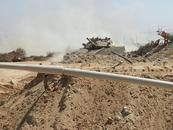
I remember calling my mom; it took me five minutes to dial because I wanted to be fully calm when I called her. I knew she was probably having a heart attack as is -- being thousands of miles away from me and not knowing what was happening. “Ima, I’m going to be out of touch, don’t ask questions. That’s all I can say.” For the first time, I think I heard someone’s heart drop on the phone -- she was audibly anxious.
We waited all night – awake with all our gear on, engines running as we saw the massive artillery and air strikes that were presumably in preparation for our entrance. At some point in the early morning, however, we were told our entrance had been delayed, and that we could go to sleep. We were partially relieved, but also upset.
I remember as I laid out my sleeping bag on the roof of the APC, I looked up at the stars above and couldn’t calm down. The adrenaline was pumping and besides, the hum of drones and the howling of fighter jets constantly interrupted the tranquility of the stars. The lights from the hellfire missiles and rockets streaking overhead did little to help.
At some point I began to count the little white lights streaming out of Gaza into the sky, like counting sheep but with Grad rockets. When I did finally fall asleep it was only for a short while. We had to wake up and repeat the daily ritual: Brush your teeth, fold the sleeping bag, eat something and start drills for the day. I remember thinking that the randomness of it all seemed to overcome everyone’s attitudes, as if after that stressful night people had become more apathetic. We were surrounded by dozens of other large forces with tanks and APCs of various types.
Total chaos
We waited all night – awake with all our gear on, engines running as we saw the massive artillery and air strikes that were presumably in preparation for our entrance. At some point in the early morning, however, we were told our entrance had been delayed, and that we could go to sleep. We were partially relieved, but also upset.
I remember as I laid out my sleeping bag on the roof of the APC, I looked up at the stars above and couldn’t calm down. The adrenaline was pumping and besides, the hum of drones and the howling of fighter jets constantly interrupted the tranquility of the stars. The lights from the hellfire missiles and rockets streaking overhead did little to help.
At some point I began to count the little white lights streaming out of Gaza into the sky, like counting sheep but with Grad rockets. When I did finally fall asleep it was only for a short while. We had to wake up and repeat the daily ritual: Brush your teeth, fold the sleeping bag, eat something and start drills for the day. I remember thinking that the randomness of it all seemed to overcome everyone’s attitudes, as if after that stressful night people had become more apathetic. We were surrounded by dozens of other large forces with tanks and APCs of various types.
Total chaos
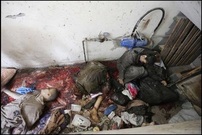
Beltagy family bled to death
The next morning we all got up at around five or six AM, and heard the terrible news of the Golani tragedy in Shejaiya. It was a slap in the face, a real wake up moment, that if it hadn’t hit us yet -- this was the real deal. That day marked the first true day of war for us; our war would last 42 days.
During that time, our unit saved several lives, treated many injured, and face the reality of death on several occasions.
We also witnessed the immense scale of the war with every trip we made into the neighborhoods in Gaza, every mortar we took and every time we heard of a firefight with terrorists who popped out of the ground.
What remains
Some things are deeply embedded in my memory, like the time a mortar almost wiped out me and my officer Daniel, and the memory of leaping into action after the explosion, running out of blind instinct to where I heard the mortar hit. I wasn’t afraid, I felt untouchable -- like a Hollywood action star. I reached the soldier who was hit, cleared the area and helped a medic put a tourniquet above his wound.
I yelled at the top of my lungs for a doctor and clearly remember seeing him approach. I remember screaming for help from the guys in my unit to put out the fires started by the mortar that were lapping at our feet, pulling the wounded soldier to safety while holding the IV bag, and watching him being shuttled away to a helicopter by my officer. It was truly one of many outer body experiences. It's in these moments that I realized how truly limitless our potential is - I was much stronger than I could ever imagine before.
The feeling of running to the APC to respond to a medical evacuation call is still in the back of my mind today too, that rush of immense adrenaline. But honestly, the moment I most appreciate was a while after we left Gaza. We were still deployed in the area, and I had not seen my whole family since the operation started. We all received 48 hours furlough at home and my friends and I got a ride to the train station in Ashkelon.
I got on a train and I remember the excitement was immense. Not only had I not told anyone I was coming home, I lied and said I wasn’t. My father and siblings had just recently arrived in Israel and joined my mother. Then came that moment: I knocked on the door and my dad answered ….. his heart seemed to stop for a moment, his eyes glazed over and he grabbed me and started yelling as if he had won the lottery. My mom heard him yelling, turned around, and sprinted towards the door, literally jumping in the air. That moment felt amazing. I’m smiling as I write this because it was truly a moment I'll cherish forever.
With that being said, the whole affair was a learning experience. It took me a while to get back to normal. The first few days back I barely left the house. Every motorcycle screaming by sounded like an incoming mortar, and sometimes they still do.
I am telling my personal story not because it is unique – quite the contrary, it isn't – I am telling it because it's mine to own. This was my personal experience, the process I went through a year ago, and I am hopeful that other reservists and soldiers will share theirs as well.
The next morning we all got up at around five or six AM, and heard the terrible news of the Golani tragedy in Shejaiya. It was a slap in the face, a real wake up moment, that if it hadn’t hit us yet -- this was the real deal. That day marked the first true day of war for us; our war would last 42 days.
During that time, our unit saved several lives, treated many injured, and face the reality of death on several occasions.
We also witnessed the immense scale of the war with every trip we made into the neighborhoods in Gaza, every mortar we took and every time we heard of a firefight with terrorists who popped out of the ground.
What remains
Some things are deeply embedded in my memory, like the time a mortar almost wiped out me and my officer Daniel, and the memory of leaping into action after the explosion, running out of blind instinct to where I heard the mortar hit. I wasn’t afraid, I felt untouchable -- like a Hollywood action star. I reached the soldier who was hit, cleared the area and helped a medic put a tourniquet above his wound.
I yelled at the top of my lungs for a doctor and clearly remember seeing him approach. I remember screaming for help from the guys in my unit to put out the fires started by the mortar that were lapping at our feet, pulling the wounded soldier to safety while holding the IV bag, and watching him being shuttled away to a helicopter by my officer. It was truly one of many outer body experiences. It's in these moments that I realized how truly limitless our potential is - I was much stronger than I could ever imagine before.
The feeling of running to the APC to respond to a medical evacuation call is still in the back of my mind today too, that rush of immense adrenaline. But honestly, the moment I most appreciate was a while after we left Gaza. We were still deployed in the area, and I had not seen my whole family since the operation started. We all received 48 hours furlough at home and my friends and I got a ride to the train station in Ashkelon.
I got on a train and I remember the excitement was immense. Not only had I not told anyone I was coming home, I lied and said I wasn’t. My father and siblings had just recently arrived in Israel and joined my mother. Then came that moment: I knocked on the door and my dad answered ….. his heart seemed to stop for a moment, his eyes glazed over and he grabbed me and started yelling as if he had won the lottery. My mom heard him yelling, turned around, and sprinted towards the door, literally jumping in the air. That moment felt amazing. I’m smiling as I write this because it was truly a moment I'll cherish forever.
With that being said, the whole affair was a learning experience. It took me a while to get back to normal. The first few days back I barely left the house. Every motorcycle screaming by sounded like an incoming mortar, and sometimes they still do.
I am telling my personal story not because it is unique – quite the contrary, it isn't – I am telling it because it's mine to own. This was my personal experience, the process I went through a year ago, and I am hopeful that other reservists and soldiers will share theirs as well.
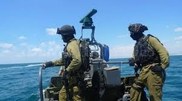
The Israeli Navy Forces kidnapped Tuesday morning six Palestinian fishermen after opening fire at three fishing boats off Gaza shores.
Chairman of the Palestinian Fishermen Syndicate Nizar Ayyash told a PIC reporter that Israeli Navy boats opened their machinegun fire at two Palestinian fishing boats.
Four fishermen were arrested while their two boats were confiscated while sailing within the three nautical miles fishing area off the coast.
Shortly after the incident, two other fishermen were arrested in the same area after firing at their boat.
Israeli Navy routinely carries out attacks against Palestinian fishermen within the permitted six nautical miles fishing zone.
Chairman of the Palestinian Fishermen Syndicate Nizar Ayyash told a PIC reporter that Israeli Navy boats opened their machinegun fire at two Palestinian fishing boats.
Four fishermen were arrested while their two boats were confiscated while sailing within the three nautical miles fishing area off the coast.
Shortly after the incident, two other fishermen were arrested in the same area after firing at their boat.
Israeli Navy routinely carries out attacks against Palestinian fishermen within the permitted six nautical miles fishing zone.

Palestinian National Initiative Secretary-General Mustafa Barghouthi stated Tuesday that thousands of homes and public facilities are still waiting for reconstruction to begin in Gaza although a whole year has passed since the Israeli summer aggression.
Gaza reconstruction conference was just a big charade while Israel’s merciless siege is still in full force, he said.
He called on the International Criminal Court to investigate the war crimes carried out during the aggression by Israeli army leaders as soon as possible.
“We will not rest until those responsible for the killing of hundreds of our children and the destruction of dozens of hospitals, medical centers, and ambulances are prosecuted.”
The best thing presented to our people on this occasion is ending the internal division, stopping political arrests, achieving national reconciliation, and creating a national leadership to confront Israeli crimes and plans, Barghouthi added.
Following the Israeli aggression on Gaza, donor countries held an international conference in Cairo which allocated $4.5 billion for the reconstruction of the Gaza Strip.
Gaza reconstruction conference was just a big charade while Israel’s merciless siege is still in full force, he said.
He called on the International Criminal Court to investigate the war crimes carried out during the aggression by Israeli army leaders as soon as possible.
“We will not rest until those responsible for the killing of hundreds of our children and the destruction of dozens of hospitals, medical centers, and ambulances are prosecuted.”
The best thing presented to our people on this occasion is ending the internal division, stopping political arrests, achieving national reconciliation, and creating a national leadership to confront Israeli crimes and plans, Barghouthi added.
Following the Israeli aggression on Gaza, donor countries held an international conference in Cairo which allocated $4.5 billion for the reconstruction of the Gaza Strip.

A year has passed after Israel launched the fiercest aggression on Gaza Strip, deepening the suffering of 1.8 million people who were already suffering from a tight siege imposed for eight consecutive years.
The aggression followed the torture to death of the Jerusalemite child Mohamed Abu Khudeir at the hands of Israeli settlers. The minor was kidnapped while on his way to perform dawn prayers in a local mosque in Shufat refugee camp.
A large-scale arrest campaign targeting dozens of ex-prisoners throughout the West Bank has also preceded the war on Gaza, followed by violent confrontations and massive protests within the Green Line and occupied Jerusalem as an Israeli settler ran over two Palestinian workers.
The aggression began on July 7 when Israel fired hundreds of missiles at Gaza Strip, destroying dozens of residential buildings and civilian homes.
For its part, Palestinian resistance responded by firing a heavy barrage of rockets towards Israeli border areas and carried out unprecedented operations against Israeli military targets.
During the 51-day aggression, 50 Gazan families were entirely wiped out according to human rights statistics.
The Euro-Mediterranean Observatory for Human Rights reported that 2,147 Palestinians were killed, including 530 children and 302 women, while 145 Palestinian families lost three or more of their members.
According to the sources, 62 mosques were totally destroyed and 109 others were partially damaged, in addition 10 Muslim cemeteries and one Christian cemetery were bombed.
The aggression followed the torture to death of the Jerusalemite child Mohamed Abu Khudeir at the hands of Israeli settlers. The minor was kidnapped while on his way to perform dawn prayers in a local mosque in Shufat refugee camp.
A large-scale arrest campaign targeting dozens of ex-prisoners throughout the West Bank has also preceded the war on Gaza, followed by violent confrontations and massive protests within the Green Line and occupied Jerusalem as an Israeli settler ran over two Palestinian workers.
The aggression began on July 7 when Israel fired hundreds of missiles at Gaza Strip, destroying dozens of residential buildings and civilian homes.
For its part, Palestinian resistance responded by firing a heavy barrage of rockets towards Israeli border areas and carried out unprecedented operations against Israeli military targets.
During the 51-day aggression, 50 Gazan families were entirely wiped out according to human rights statistics.
The Euro-Mediterranean Observatory for Human Rights reported that 2,147 Palestinians were killed, including 530 children and 302 women, while 145 Palestinian families lost three or more of their members.
According to the sources, 62 mosques were totally destroyed and 109 others were partially damaged, in addition 10 Muslim cemeteries and one Christian cemetery were bombed.
Truce violations List of names Pictures of martyrs
Days: Aug: 26 - 25 - 24 - 23 - 22 - 21 - 20 - 19 - 18 - 17 - 16 - 15 - 14 - 13 - 12 - 11 - 10 - 9 - 8 - 7 - 6 - 5 - 4 - 3 - 2 - 1
July: 31 - 30 - 29 - 28 - 27 - 26 - 25 - 24 - 23 - 22 - 21 - 20 - 19 - 18 - 17 - 16 - 15 - 14 - 13 - 12 - 11 - 10 - 9 - 8
